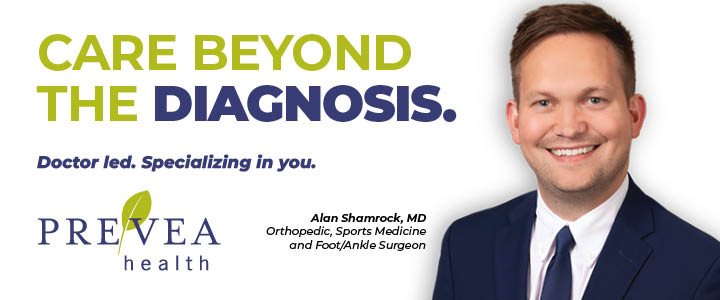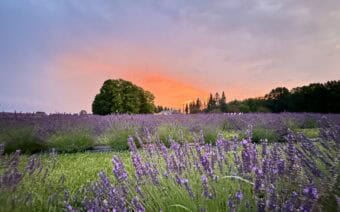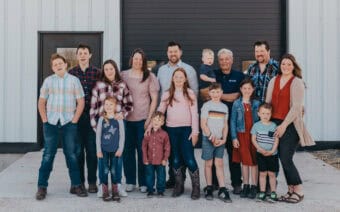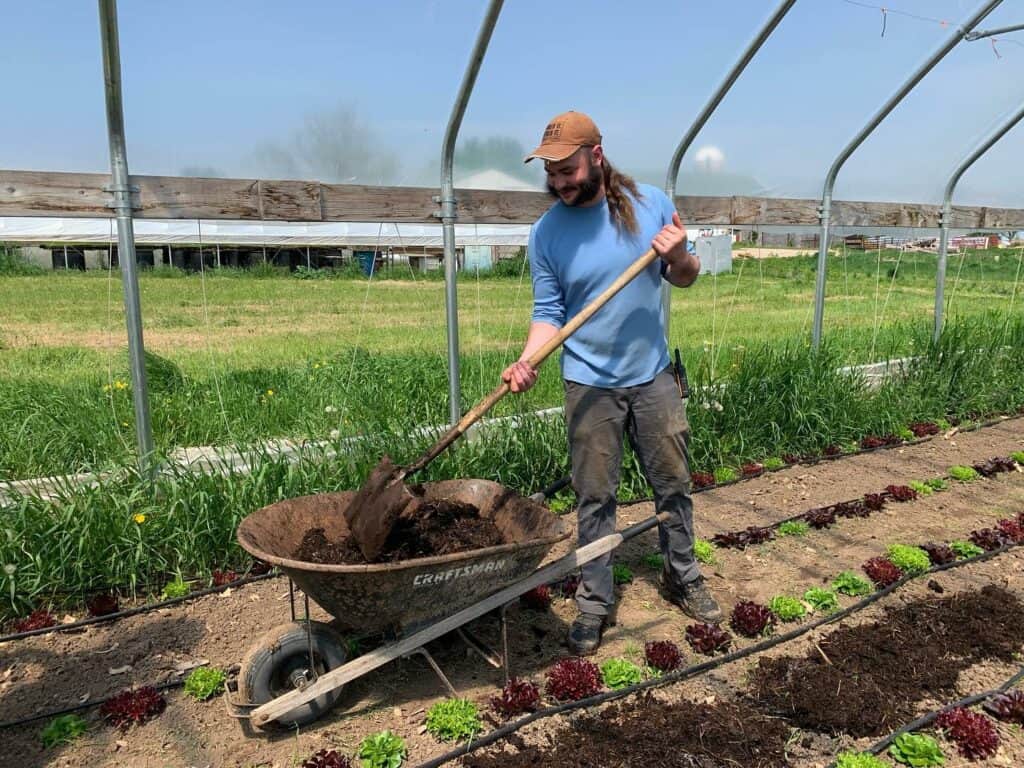
June 17, 2024
SEYMOUR – Since its beginnings, Andrew Adamski – owner of Full Circle Community Farm (W2407 Hofa Park Road in Seymour) – said he has been committed to using the environment as it was meant to be used.
The farm’s sustainability efforts, Adamski said, were recently recognized by Marbleseed, which named Full Circle Community Farm its 2024 Organic Farm of the Year.
Marbleseed is a farmer-led organization in connection with the organic and sustainable farming movement in the Midwest.
“Being named the Farm of the Year was humbling and incredible from an organization I almost feel is like an extended family to me,” Adamski said.
Full Circle, he said, was nominated for the award by a friend of the family.
“The board at Marbleseed had the choice of choosing a bunch of different farms, and they chose us this year,” he said. “I feel honored.”
How it began
Like many farms and businesses, the history of Full Circle goes back to an earlier-generation family member.
“The story of our farm is a bit complicated,” Adamski laughed. “It’s the farm I grew up on. When I was a kid, my parents ran a dairy farm, and they did everything pasture-based – they were raising cattle. They transitioned to organic in about 2003, and at that point, started shipping their milk to Organic Valley (in La Farge, Wisconsin).”
Adamski said his parents continued with the organic farming techniques while he attended college – earning a degree in soil microbial ecology.
“I started (studying) biochemistry and thought, ‘I’m never going to come back to the farm,’” he said. “(However), by the time I completed my masters, I thought, ‘what can I do with this degree that can benefit humanity as a whole?’”

Adamski said that is when the wheels started turning.
How Full Circle operates
Adamski said his research on how most U.S. farmers operate – known widely as industrial agriculture – differed greatly from how he wanted to operate a farm.
“With industrial agriculture, it’s more about short-term gains in exchange for long-term longevity,” he said. “The soil, the ecosystems around us, the people’s health who eat the food and down the stream to nutrient runoff that chokes up waterways and leads to dead zones in the Great Lakes and the Gulf of Mexico. It disrupts rural communities and communities that rely on food – basically, all of humanity.”
Adamski said the impetus for returning to Seymour was his desire to do things differently.
“I think we can do it differently in a way that nurtures soil, the ecosystem and the people who are eating the food,” he said. “We can use all the knowledge and modern technology we’ve built up over the past 150 years – since the start of the industrialization of agriculture and learn from our mistakes.”
Adamski said Full Circle is based on real food.
“I can pick a pea pod off the vine and eat it – that’s real food,” he said. “You don’t have to do anything to it but eat it.”
The main thing Full Circle does to keep it as organic as possible, Adamski said, is keeping plants growing in the ground as much as possible and for as long as possible throughout the year.
“It all starts with the pasture – it’s mimicking grasslands,” he said. “It’s the foundation of what we do. We have ecosystems – especially in Northeastern Wisconsin – that have been some of the most productive and diverse ecosystems on Earth… How did they do it? It’s photosynthesis and based on the plants.”
From there, Adamski said, it’s layering the animals on top of that.
“Thinking about the huge herds of animals that used to live here, you think about the nutrient cycling they brought,” he said. “We use the pastures and cows to mimic grasslands – that’s what my parents started doing. There used to be chestnuts, hazelnuts, gooseberries and raspberries. There are all these foods we’ve forgotten about that the indigenous people used and survived on for 20,000 years.”
Adamski said they’ve learned from the past to grow high-quality vegetables today.
“On an acre of field, we have enough food to feed 200 families,” he said. “There are tons of places doing this across the globe, but our goal is to feed the community healthily.”
Adamski said his parents still oversee the cattle herd – and “they are 100% grass-fed.”
“From the day they are born to the time they are butchered, they survive on grass,” he said. “We also have pigs, but they are a bit different – they can’t survive on grass alone, so we supplement them with some grains, vegetables, eggs, etc.”
Adamski said cattle have microbes in their guts that take the cellulose (in the grass) and turn it into protein and energy.
“There are also organic fertilizers, but we use the cows to help there,” he said. “The cow’s manure on the pasture fertilizes the grass they are eating. That’s the reason behind the name of the farm – it’s all full circle.”
Adamski said they do use some fertilizers on certain parts of the farm, but even that is natural.
“This area’s soil is low on boron and manganese, so we supplement with crushed granite and things like that,” he said. “Those trace elements in those rocks help fertilize some of the minerals that might be missing in some areas of the farm.”
Adamski said Full Circle would like to further diversify its options soon.
“Perennial nuts… apples, plums, cherries and pears – it will help diversify those pastures,” he said. “One chestnut tree could produce two tons of nuts. Seeing where we need to go and trying to get it done now, if we don’t, we’re going to be in trouble. You can use chestnut and hazelnut flour to make Doritos and Cheetos.”

As for the future of Full Circle, Adamski said, “as soon as you think you have things figured out, then we know we’re in trouble.”
“We’re not satisfied with simply doing a little bit here and there,” he said. “As an organic farmer, you have to constantly think and innovate about what the future needs will be. With industrial farming methods being around for many decades, and the system we are using being around for millions of years – I’d take the million years that’s proven.”
‘Change is inevitable’
Adamski said the farming industry, he thinks, will inevitably change.
“The World Living Soils Forum said we only have 20 harvests (using industrial farming methods) left in this country,” he said. “That’s based on the amount of topsoil that is left – it gets eroded yearly. There’s only so much we can do at this scale – eventually, it’s not going to be possible to grow food in this way. I’d say it’s better to start sooner rather than later to find alternative methods.”
Adamski said there’s also the added pressure of suburban sprawl.
“Farmland is disappearing,” he said. “Farmers have been forced into areas (to grow food) that maybe weren’t meant for farming. Even if you look at Green Bay – Bellevue, De Pere, Howard and Suamico – you see the suburban sprawl… My mom grew up on West Point Road in Green Bay – that was all farmland.”
With the future uncertain, Adamski said Full Circle Community Farm will continue to move forward with its sustainable focus and hope it inspires others to do the same.
Part of these efforts, Adamski said, are supported by the farm’s participation in SLO Farmers Co-op, a cooperative of farmers in Northeast Wisconsin that pool resources and high-quality organic vegetables, fruit and meat to offer CSA (Community Supported Agriculture) Farm Boxes.
“It offers you convenience and choice because it is fully customizable and home delivery is available inside our delivery area of Green Bay and the Fox Valley,” he said.
For more information, visit fullcircle.farm.
 High-water mark: Appleton tap water named state’s tastiest
High-water mark: Appleton tap water named state’s tastiest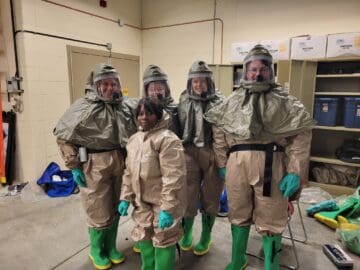 Built on safety, powered by people
Built on safety, powered by people

